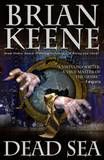 Leisure / July 2007
Leisure / July 2007
Reviewed by: Jeff Burk
Brian Keene became a household name in the horror genre with the publication of The Rising in 2003 and City of the Dead in 2005. The books injected the literary zombie with some much needed life and innovation. After his two zombie novels, Keene went onto display his versatility in a series of popular books that included the bizarrely horrifying The Conqueror Worms and the child abuse-cum-corpse eating drama Ghoul. With these books, Keene cemented his popularity and proved that he was more that just "the zombie guy." Now with his fifth novel from Leisure Books, Dead Sea, Brian Keene has returned to the monster that made him famous.
First off, Dead Sea is not part of the same universe as the seminal The Rising. Here we get classic Romero-influenced zombies instead of the malicious possessed corpses of Keene's previous zombie works. Though Keene does bring back the idea of zombie-animals, they are slow-moving and unthinking as well. In this world, a plague name Hamelin's Revenge has wiped out most of the world's human and animal populations. We are introduced to Lamar Reed, one of the few humans left alive, holding out in a plague ravaged Baltimore. After a city-wide fire forces him to flee his hiding place in Baltimore, he boards a ship along with about twenty other survivors. From there on, the characters simply battle to survive.
While Lamar is fleeing the ravaged city, he encounters two orphaned children, Malik and Tasha. In these two characters, Keene displays his talent for creating three-dimensional, engaging characters. They are children of the new zombie world. Both kids are interested in playing and just having a family, but are willing to put a bullet through a zombie's head when necessary. When they latch onto Lamar as a father figure, the novel benefits from the added family-drama subplot. The problems with the social idea of family are a common theme for Keene (see Ghoul for the best example of this). In Dead Sea, he explores the idea of families born of circumstance versus blood or even choice.
Plot is normally one of the places in which Keene's books shine. He has a talent for creating bizarre and unique stories that constantly keep the reader guessing. Dead Sea, unfortunately, does not live up to Keene's previous work in this aspect. Most of the book concerns the survivors making various stops and fighting zombies, and, while the encounters are suitably exciting and graphic, they are nothing that the avid zombie fan has not read and seen ad nauseum. In the final section of the book, Keene does manage to pull off some innovative new spins on zombiism, but by this point in the novel, it seems too little, too late.
While the plot itself is not very original, Keene uses some interesting literature conventions in its telling. The character of Professor Williams (one of the ships more colorful survivors) introduces the reader to the interesting idea of character archetypes. He purports that the various survivors are in fact fulfilling classic roles of literature; such as "the hero" and "the warrior". In the hands of many writers, this technique would commonly come across as cheesy and self-indulgent, but Keene manages to integrate this meta-commentary seamlessly into the classic survival-horror story.
Brian Keene consistently pumps out high-quality works of horror in both the small press and the mass market. While Dead Sea may not be as groundbreaking or as original as his previous works, it is still just as gripping and fast-paced a read as anything else he has written. If you’re a die-hard fan of zombies or just like your horror tales with lots of action, Keene has another treat in store for you.
Purchase Brian Keene's Dead Sea